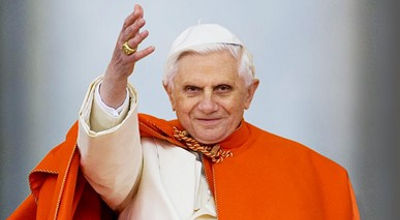Pope Urging Church Leaders to Put Aside Rivalries
With passing phrases and striking images, Pope Benedict is assembling a last testament to his Roman Catholic Church, urging its leaders to put aside their rivalries and think only of the unity of the faith.
The message, slipped into statements both before and after his shock resignation announcement on Monday, reads like a veiled rebuke to leading cardinals jockeying for influence in the upcoming conclave and in the papacy that it will produce.
His vague comments could also be hints that it was internal Vatican power struggles, such as those which led to the Vatileaks scandal involving Benedict’s butler last year, that prompted him to take the almost unprecedented step of quitting the leadership of the world’s largest church.
Benedict, 85, will step down on February 28, triggering a new conclave—the closed-door papal election—in mid-March with no discernible front runner and several factions already putting forward their ideas for who or what the new pontiff should be.
The German pope urged the faithful on Wednesday to “show the face of the Church and how that face is sometimes disfigured”.
“I am thinking particularly about sins against the unity of the Church, about divisions in the body of the Church,” he said.
“Overcoming individualism and rivalry is a humble sign,” he added during his last public Mass in St. Peter’s Basilica.
Italian newspapers, whose Vatican watchers are weighing every word uttered by Benedict these days, seized on the terms “disfigured face” and “rivalry” as what the Milan daily Corriere della Sera called “signals hurled at the conclave”.
Sodano v. Bertone
Several analysts highlighted the well-known rivalry between Cardinal Angelo Sodano, the former secretary of state or number two man at the Vatican under Benedict’s predecessor Pope John Paul II, and the current deputy, Cardinal Tarcisio Bertone.
Sodano, who as dean of the College of Cardinals will help the electors prepare for the conclave, has never hidden his disdain for the scandal-plagued Bertone, whose role as Vatican chamberlain is to organize events leading up to the conclave.
Since succeeding him in 2006, Bertone has purged several of Sodano’s proteges from the powerful Secretariat of State, dispatching them to ambassadorial posts abroad or less central roles within the Vatican itself.
Many of the gaffes of the Benedict era, from his giving a lecture at Regensburg in 2006 which angered Muslims to the purloined papers that led to the Vatileaks scandal, are blamed by the Sodano camp on what they see as Bertone’s mismanagement.
The leaked papers published in May in the book “His Holiness” documented cases of petty corruption and in-fighting within the Vatican walls, many of them reflecting an internal backlash against Bertone and his leadership.
The trial last October of Benedict’s butler for leaking the documents left many questions about a suspected wider Vatican intrigue unanswered. The Vatican has never published its own internal inquiry into the scandal, which may have revealed to Benedict in-fighting on a greater scale than he had imagined.
Bad Fish
Watching their schedules carefully, the Rome daily La Repubblica reported that both Sodano and Bertone have “launched a round of contacts with the most influential cardinals” in preparation for the papal election due to be held in mid-March.
Benedict, who before the 2005 conclave that elected him had denounced the “filth in the Church” due to sexual abuse and the “dictatorship of relativism” threatening the faith, has stepped up warnings against Church rivalry and disunity recently.
On Saturday, two days before announcing his resignation, he brought up the issue of clerical arrogance when he warned seminarians in Rome against excessive pride in themselves because God had chosen them to become priests.
“It would be triumphalism if we thought God has chosen me because I am so great,” he said. “That would really be mistaken triumphalism.”
In a speech on October, in the wake of the Vatileaks trial, he recalled that “in the Lord’s fields there are always weeds … in Peter’s nets, there are also bad fish”.
In a little noticed decision back in 2007, Benedict changed the 1996 conclave rules issued by John Paul II to bring back the traditional two-thirds majority needed to elect a pope.
John Paul’s rules called for cardinals to switch to a simple majority if they were deadlocked after 13 days of voting, a move Benedict thought could lead to a disputed papacy rather than one on which two thirds of the voting cardinals had signed off.
There is concern that Benedict’s resignation, making him the first living former pope since the bitter schisms of the Middle Ages, might make him a focus for opposition to his successor—though he himself stressed on Thursday that he was “withdrawing into prayer,” to lead a cloistered life “hidden from the world.”
Editing by Alastair Macdonald
© 2013 Thomson Reuters. All rights reserved.




























































